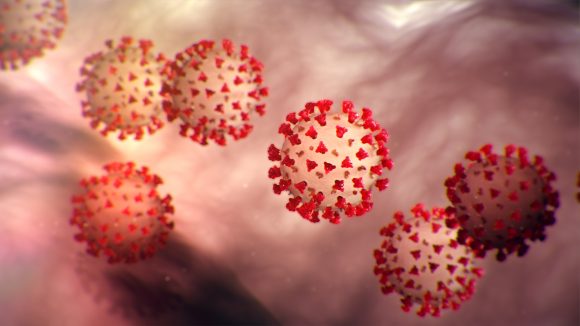
The novel coronavirus. (Courtesy Center for Disease Control)
Volunteer organization Make4Covid is rallying to create protective equipment for hospitals around Colorado. In Boulder, community members are coming together to create face shields to help local hospitals stop the spread and treat patients of COVID-19 with the University of Colorado Boulder joining the cause.
Make4Covid, a limited cooperative association, is currently the largest organization in the United States that is set up to create and distribute protective equipment in response to COVID-19. CU Boulder professors and faculty have been allowed to reopen nine labs on campus to use 3D printers for the face shield making process.
One of the campus labs being used to print is a prototyping facility called the Idea Forge, a cross-disciplinary space where students can boost learning through hands-on experience and projects.
“We’re offsetting the supply chain issues that a lot of the medical campuses are having,” Idea Forge founder and current face shield maker Byron Rudisill said. “The materials we have been using have been asked for specifically for sterilization purposes.”
Rudisill’s printers make approximately 140 headband pieces for the face shields per week. The turnaround time for each piece is about 24 hours.
Make4Covid designs, manufactures, tests and delivers the equipment for local hospitals to combat the shortages being faced. Local community members work within the organization to facilitate creating the masks.
Face shields are what Make4Covid is focused on making within Boulder and are made of a headband piece created by 3D printers, elastics and a plastic face cover. The shields protect against droplets while ordinary face masks specifically work against spreading COVID-19, though organizers said just having one or the other does not completely prevent spreading the virus.
When Make4Covid first started, only about 100 people were expected to join, according to organizers. Currently, there are over 1600 volunteers working within Colorado.
“A lot of other states are looking at the Make4Covid effort as an example,” Rudisill said. “It’s pretty incredible how you can have people from all backgrounds band together and do something.”
“People can join in and then become part of the network,” Kathryn Riddle Penzkover said. Penzkover was able to take home some of the 3D printers from CU Boulder’s Science Discovery Center where she works as the assistant director.
The organization creates the masks through a multi-step process, all while ensuring that they do not spread the virus in any way. Parts of the masks are commonly left on doorsteps or drop off areas to prevent contact before being put together by the next person in the chain.
Hospitals are able to put in a request for how many masks they need, but a priority is put on those in rural towns and who will run out the fastest. The designs and masks themselves are looked over by healthcare professionals to make sure they are sanitary and safe to use in hospitals.
“The goal right now is to continue as long as there’s a need,” Organizer Daria Kotys-Schwartz said. “Much of this effort is a volunteer effort.”
Over 6,000 face shields have been delivered to local hospitals within Colorado. The organization hopes that they do not have to provide equipment long term but will continue as long as the shortage does.
“I think unfortunately this will not be the last time we have to deal with something like this,” Assistant Director of the Idea Forge Rebecca Komarek said.
“The design team worked with doctors and healthcare workers,” Boulder organizer Victoria Gemma Lanaghan said. She works at the Idea Forge at CU Boulder.
Creative Labs Manager for the Programs in Environmental Design Jeffrey Allen reopened his lab to assist in printing the masks. He works approximately eight hours a day, five days a week in isolation with 3D printers to print headbands. They take roughly two hours each. Allen said the organization has grown significantly since he first joined in March.
“I’ve been really amazed by how rapidly and quickly it has grown,” Allen said. “One person can make a difference.”
Contact CU Independent Senior News Editor Tory Lysik at tory.lysik@colorado.edu.
